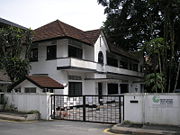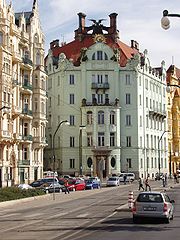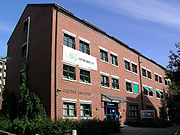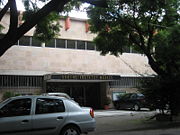
Goethe-Institut
Encyclopedia



Germany
Germany , officially the Federal Republic of Germany , is a federal parliamentary republic in Europe. The country consists of 16 states while the capital and largest city is Berlin. Germany covers an area of 357,021 km2 and has a largely temperate seasonal climate...
cultural
Culture
Culture is a term that has many different inter-related meanings. For example, in 1952, Alfred Kroeber and Clyde Kluckhohn compiled a list of 164 definitions of "culture" in Culture: A Critical Review of Concepts and Definitions...
institution operational worldwide, promoting the study of the German language
German language
German is a West Germanic language, related to and classified alongside English and Dutch. With an estimated 90 – 98 million native speakers, German is one of the world's major languages and is the most widely-spoken first language in the European Union....
abroad and encouraging international cultural exchange and relations. The Goethe-Institut also fosters knowledge about Germany by providing information on German culture, society and politics. This includes not only the exchange of film
Film
A film, also called a movie or motion picture, is a series of still or moving images. It is produced by recording photographic images with cameras, or by creating images using animation techniques or visual effects...
s, music
Music
Music is an art form whose medium is sound and silence. Its common elements are pitch , rhythm , dynamics, and the sonic qualities of timbre and texture...
, theatre
Theatre
Theatre is a collaborative form of fine art that uses live performers to present the experience of a real or imagined event before a live audience in a specific place. The performers may communicate this experience to the audience through combinations of gesture, speech, song, music or dance...
, literature
Literature
Literature is the art of written works, and is not bound to published sources...
, and the like, but also the values of civil society. Goethe cultural societies, reading rooms, and exam and language centers have played a central role in the cultural and educational policies of Germany for close to 60 years. It is named after German
German literature
German literature comprises those literary texts written in the German language. This includes literature written in Germany, Austria, the German part of Switzerland, and to a lesser extent works of the German diaspora. German literature of the modern period is mostly in Standard German, but there...
polymath
Polymath
A polymath is a person whose expertise spans a significant number of different subject areas. In less formal terms, a polymath may simply be someone who is very knowledgeable...
Johann Wolfgang von Goethe
Johann Wolfgang von Goethe
Johann Wolfgang von Goethe was a German writer, pictorial artist, biologist, theoretical physicist, and polymath. He is considered the supreme genius of modern German literature. His works span the fields of poetry, drama, prose, philosophy, and science. His Faust has been called the greatest long...
.
The Goethe-Institut draws its material from many sections of the cosmopolitan German society and culture, combining the experience and ideas of its partners with cross-cultural expertise, the principle of dialogue and partnership, offering support to all those actively involved with Germany and its language and culture. The Goethe-Institut e.V. is an autonomous body and politically independent.
Partners of the institute and its centers are public and private cultural institutions, the federal states, local authorities and the world of commerce. Much of the Goethe-Institut's overall budget consists of yearly grants from the German Foreign Office and the German Press Office. The relationship with the Foreign Office is governed by general agreement. Self-generated income and contributions from sponsors and patrons, partners and friends broaden the scope of the work of the Goethe-Institut. The Goethe-Institut carefully coordinates its activities with other mediators of cultural and educational foreign policy.
History
1951The Goethe-Institut is founded as successor to the German Academy (Deutsche Akademie
Deutsche Akademie
The Deutsche Akademie was a German cultural institute founded in 1925 at Munich, under the Weimar Republic. The controversial geopolitician Karl Haushofer was among the academics associated with it in its initial phases....
/DA). Its first task is to provide further training for foreign German teachers in Germany.
1953
The first language courses run by the Goethe-Institut begin in Bad Reichenhall. Due to growing demand, new centres of learning are soon opened in Murnau and Kochel, the focus of selection being on towns which are small and idyllic and which show post-war Germany at its best. Lessons are taught from the first textbook developed by the Goethe-Institut, the now legendary "Schulz-Griesbach".
1953-55
The first foreign lectureships of what was the German Academy are taken on by the Goethe-Institut. Responsibilities include German tuition, teacher training and providing a program of cultural events to accompany courses.
1959-60
On the initiative of the head of the arts sector of the Foreign Office, Dieter Sattler, the Goethe-Institut gradually takes over all of the German cultural institutes abroad. This development of a broad international institute network signals an intensification of Germany's foreign cultural policy.
1968
Influenced by the student revolts of the late 1960s the Goethe-Institut readjusts its program of cultural events to include socio-political topics and avant-garde art.
1970
Acting on behalf of the Foreign Office Ralf Dahrendorf develops his "guiding principles for foreign cultural policy". Cultural work involving dialog and partnership is declared the third pillar of German foreign policy. During the Willy Brandt era the concept of "extended culture" forms the basis of activities at the Goethe-Institut.
1976
The Foreign Office and the Goethe-Institut sign a general agreement governing the status of the Goethe-Institut, henceforth an independent cultural organization.
1980
A new concept regarding the location of institutes within Germany is drawn up. Places of instruction in small towns, mostly in Bavaria, are replaced by institutes in cities and university towns.
1989/90
The fall of the Berlin Wall also marks a turning point for the Goethe-Institut. Its activities in the 1990s are thus strongly centred on Eastern Europe. Numerous new institutes are set up as a result.
2001
The Goethe-Institut merges with Inter Nationes.
2004
The Goethe-Institut establishes the first Western information centre in Pyongyang, North Korea (closed in 2009).
The Goethe-Institut Inter Nationes reverts to its original and official name, Goethe-Institut (GI).
2005
The Goethe-Institut is honored with the Prince-of-Asturias Prize of Spain
2007
For the first time in more than ten years the German parliament decides to increase the funds of the Goethe-Institut.
2010
Bruno Bozzetto
Bruno Bozzetto
Bruno Bozzetto is an Italian cartoon animator, creator of many short pieces, mainly of a political or satirical nature. He created his first animated short "Tapum! the weapons' story" in 1958 at the age of 20. His most famous character, a hapless little man named "Signor Rossi" Bruno Bozzetto...
created a new Goethe-Institut film named "Va Bene".
Organization
The Goethe-Institut is mainly financed by the national government of Germany, and has around 3,300 employees and an overall budget of approximately 278 million euroEuro
The euro is the official currency of the eurozone: 17 of the 27 member states of the European Union. It is also the currency used by the Institutions of the European Union. The eurozone consists of Austria, Belgium, Cyprus, Estonia, Finland, France, Germany, Greece, Ireland, Italy, Luxembourg,...
s at its disposal, more than half of which is generated from language course tuition and examination fees. The Goethe-Institut offers scholarships to students from foreign countries. Most of these scholarships, however, are aimed at teachers of German.
The Goethe-Institut has its headquarters in Munich
Munich
Munich The city's motto is "" . Before 2006, it was "Weltstadt mit Herz" . Its native name, , is derived from the Old High German Munichen, meaning "by the monks' place". The city's name derives from the monks of the Benedictine order who founded the city; hence the monk depicted on the city's coat...
. Its president is Klaus-Dieter Lehmann
Klaus-Dieter Lehmann
Klaus-Dieter Lehmann is a German librarian and president of the Goethe-Institut since April 2008. In 1988 he became director of the Deutsche Bibliothek, Frankfurt, the national library of West Germany...
, the General Secretary Dr. Hans-Georg Knopp; Financial Manager Mr. Jürgen Maier.
Exams
The institute has developed a series of exams for learners of German as a foreign language (Deutsch als Fremdsprache, DaF) at all levels: A1 up to C2. These can be taken both in Germany and abroad, and have been adapted to fit into the Common European Framework of Reference for LanguagesCommon European Framework of Reference for Languages
The Common European Framework of Reference for Languages: Learning, Teaching, Assessment, abbreviated as CEFR, is a guideline used to describe achievements of learners of foreign languages across Europe and, increasingly, in other countries...
(CEF), the standard for European language testing. There is also one exam, the Großes Deutsches Sprachdiplom, which is at a higher level than the highest CEF level. Below is a table of the basic Goethe-Institut exams as they fit into the scheme:
| CEF Common European Framework of Reference for Languages The Common European Framework of Reference for Languages: Learning, Teaching, Assessment, abbreviated as CEFR, is a guideline used to describe achievements of learners of foreign languages across Europe and, increasingly, in other countries... level | Goethe-Institut exam | Instructional Hours Needed |
| C2 | Zentrale Oberstufenprüfung Zentrale Oberstufenprüfung The Zeugnis über die Zentrale Oberstufenprüfung is a Goethe Institute certificate proving high-level German language ability. The ZOP is rated at level C2 of the Common European Framework of Reference for Languages — C2, the highest of the CEFR levels, signals a level of language ability... , Kleines Deutsches Sprachdiplom | 750-900 (both) |
| C1 | Goethe-Zertifikat C1 - Zentrale Mittelstufenprüfung (neu), Prüfung Wirtschaftsdeutsch | 600-750 (both) |
| B2 | Zertifikat Deutsch für den Beruf, Goethe-Zertifikat B2 | 375-540 (ZDfB), 450-600 (GZ B2) |
| B1 | Zertifikat Deutsch | 300-450 |
| A2 | Start Deutsch 2 | 128-255 |
| A1 | Start Deutsch 1 | 64-128 |
In 2000, the Goethe-Institut also helped to found the Society for Academic Test Development (Gesellschaft für Akademische Testentwicklung e.V.). The resulting TestDaF exams are run by the TestDaF-Institut
TestDaF-Institut
The TestDaF-Institut is an institute for language testing in Bochum, Germany. It runs the TestDaF, short for Test Deutsch als Fremdsprache: "Test of German as a foreign language", and is aimed at people who would like to study at German universities, academics and scientists.The institute is part...
in Hagen
Hagen
Hagen is the 39th-largest city in Germany, located in the federal state of North Rhine-Westphalia. It is located on the eastern edge of the Ruhr area, 15 km south of Dortmund, where the rivers Lenne, Volme and Ennepe meet the river Ruhr...
. The tests are supported by the German Academic Exchange Service (DAAD
German Academic Exchange Service
The German Academic Exchange Service or DAAD is the largest German support organisation in the field of international academic co-operation....
) and are aimed at people who would like to study at German universities, academics and scientists. The TestDaF can be taken in Germany as well as in 65 countries worldwide.
Recognition
In 2005, along with the Alliance françaiseAlliance française
The Alliance française , or AF, is an international organisation that aims to promote French language and culture around the world. created in Paris on 21 July 1883, its primary concern is teaching French as a second language and is headquartered in Paris -History:The Alliance was created in Paris...
, the Società Dante Alighieri, the British Council
British Council
The British Council is a United Kingdom-based organisation specialising in international educational and cultural opportunities. It is registered as a charity both in England and Wales, and in Scotland...
, the Instituto Cervantes
Instituto Cervantes
The Cervantes Institute is a worldwide non-profit organization created by the Spanish government in 1991. It is named after Miguel de Cervantes , the author of Don Quixote and perhaps the most important figure in the history of Spanish literature...
and the Instituto Camões
Instituto Camões
The Instituto Camões is an institution created in 1992 for the world-wide promotion of the Portuguese language and culture...
, the Goethe-Institut was awarded the Prince of Asturias Award
Prince of Asturias Awards
The Prince of Asturias Awards are a series of annual prizes awarded in Spain by the Prince of Asturias Foundation to individuals, entities or organizations from around the world who make notable achievements in the sciences, humanities, and public affairs....
for outstanding achievements in communications and the humanities.
In 2007, it received a special Konrad Duden Prize for its work in the field of German language.
By country

- In IranIranIran , officially the Islamic Republic of Iran , is a country in Southern and Western Asia. The name "Iran" has been in use natively since the Sassanian era and came into use internationally in 1935, before which the country was known to the Western world as Persia...
, the Goethe-Institut officially opened in TehranTehranTehran , sometimes spelled Teheran, is the capital of Iran and Tehran Province. With an estimated population of 8,429,807; it is also Iran's largest urban area and city, one of the largest cities in Western Asia, and is the world's 19th largest city.In the 20th century, Tehran was subject to...
in 1958, but was forced to close down in 1981 due to a diplomatic row with Germany. It reopened under the German embassy in Tehran as a "point for dialogue." - In PakistanPakistanPakistan , officially the Islamic Republic of Pakistan is a sovereign state in South Asia. It has a coastline along the Arabian Sea and the Gulf of Oman in the south and is bordered by Afghanistan and Iran in the west, India in the east and China in the far northeast. In the north, Tajikistan...
the LahoreLahoreLahore is the capital of the Pakistani province of Punjab and the second largest city in the country. With a rich and fabulous history dating back to over a thousand years ago, Lahore is no doubt Pakistan's cultural capital. One of the most densely populated cities in the world, Lahore remains a...
chapter of Goethe-Institut is called Annemarie SchimmelAnnemarie SchimmelAnnemarie Schimmel, SI, HI, was a well known and very influential German Orientalist and scholar, who wrote extensively on Islam and Sufism. She was a professor at Harvard University from 1967 to 1992.-Early life:...
Haus in honour of the well known and very influential German OrientalistOrientalistOrientalist may refer to:*A scholar of Oriental studies*A person or thing relating to the Western intellectual or artistic paradigm known as Orientalism...
and scholar, who wrote extensively on Islam and Sufism. The Annemarie-Schimmel-Haus shares its premises with the Alliance françaiseAlliance françaiseThe Alliance française , or AF, is an international organisation that aims to promote French language and culture around the world. created in Paris on 21 July 1883, its primary concern is teaching French as a second language and is headquartered in Paris -History:The Alliance was created in Paris...
Lahore (AF) and together they regularly organise joint cultural events. - In IndiaIndiaIndia , officially the Republic of India , is a country in South Asia. It is the seventh-largest country by geographical area, the second-most populous country with over 1.2 billion people, and the most populous democracy in the world...
the institutes are called Max Müller BhavansMax MüllerFriedrich Max Müller , more regularly known as Max Müller, was a German philologist and Orientalist, one of the founders of the western academic field of Indian studies and the discipline of comparative religion...
in honour of the famous German philologist and IndologistIndologyIndology is the academic study of the history and cultures, languages, and literature of the Indian subcontinent , and as such is a subset of Asian studies....
. - In Indonesia there are 3 Goethe-Institute: in JakartaJakartaJakarta is the capital and largest city of Indonesia. Officially known as the Special Capital Territory of Jakarta, it is located on the northwest coast of Java, has an area of , and a population of 9,580,000. Jakarta is the country's economic, cultural and political centre...
, BandungBandungBandung is the capital of West Java province in Indonesia, and the country's third largest city, and 2nd largest metropolitan area in Indonesia, with a population of 7.4 million in 2007. Located 768 metres above sea level, approximately 140 km southeast of Jakarta, Bandung has cooler...
, and SurabayaSurabayaSurabaya is Indonesia's second-largest city with a population of over 2.7 million , and the capital of the province of East Java...
and have 29 school partners from Indonesia
Virtual presence
The Goethe-Institut offers e-learning courses.See also
- List of Goethe-Institut locations
- German American Partnership ProgramGerman American Partnership ProgramThe German American Partnership Program , is a high school exchange program between schools in the United States and Germany, sponsored by the US State Department and the German Foreign Office. Organizational support is provided by the Goethe-Institut. The program was started in 1977...
- Goethe MedalGoethe MedalThe Goethe Medal, also known as the Goethe-Medaille, is a yearly prize given by the Goethe Institute honoring non-Germans for meritorious contributions in the spirit of the Institute. It is an official decoration of the Federal Republic of Germany....

